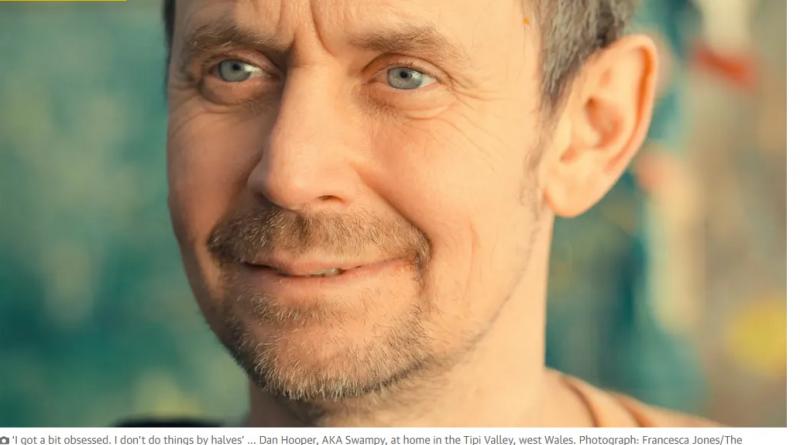Swampy on tunnels, bailiffs and 25 years of protest: ‘We need to stop capitalists destroying the planet’

He became a household name in the 90s, then disappeared from view. But he never stopped protesting. Now the man known as the human mole is busier than ever
Dan works in forestry. Clare is a school counsellor. Recently, they took their youngest son to a superhero film. Their middle son loves football. They miss their eldest, Rory, who left home a few months ago.
The Hoopers are much like any other family with three children, or they would be if Dan did not have an unusual superpower. He is the best DIY digger of tunnels in the country. And for a quarter of a century he has burrowed passageways into the paths of new roads, runways and railways that destroy the countryside and add to spiralling carbon emissions and global heating. In this strange underland, Dan has another name: Swampy.
The story of Swampy, “the human mole”, was a tabloid fable in the 1990s. Margaret Thatcher’s “Roads for Prosperity” – supposedly the biggest road-building scheme since the Romans – was attracting growing opposition. Protests culminated outside Newbury, Berkshire, in 1996 when thousands marched against a bypass. Young people took to treehouses and threw themselves on diggers.
Among them was a 23-year-old from leafy Buckinghamshire. Hooper learned to dig tunnels in which activists could hide, halting construction while bailiffs were forced to crawl underground to evict them. A fellow activist, Angel, called him “Swamp Boy” because of his green waterproofs, dreadlocks and generally muddy demeanour. Swampy stuck. Then, after a biblical seven days and seven nights in a tunnel to stop a dual carriageway scheme on the A30 in Devon in 1997, Swampy emerged into the media glare. He may have been scruffy, but he had the loveliest smile.
As the Guardian put it, “Swampy Fever” struck. “His father wears a suit each day to commute into west London where he works as a computer consultant,” gasped the Daily Mail. Both his Mail-reading parents were vocally proud of their son.
Swampy became the poster boy of environmental activism. He was the youngest panellist on Have I Got News For You, Coronation Street introduced an eco-warrior called Spider, while the Judge Dredd comic created Spawny. One headline had him heralding the end of 90s lad culture: “Lads limp off as girls swoon for sexy Swampy.”
But when Swampy, who is now 48, joined the tunnellers trying to stop Manchester airport’s second runway in 1997, he suffered a backlash. Conservative transport minister John Watts wanted Swampy “buried in concrete”. His high profile grated with the non-hierarchical environmental movement. And the publicity he attracted didn’t seem to inspire more people to join non-violent direct action.
So Hooper stopped talking to the media and vanished from view. It was two decades later, in 2020, when he reappeared, balanced precariously on a tower of bamboo poles built in the path of HS2, the high-speed railway from London to Birmingham. This year, he dug tunnels to halt HS2 works at Euston station in London and for the same project in Wendover, Buckinghamshire, where he and colleagues resisted eviction for 28 days below ground. While Swampy hunched in a claustrophobic cavity in the chalk, Alok Sharma, Tory president of the Cop26 climate summit, was declaring that modern-day Swampys were “in boardrooms, in government departments, in multilateral development banks and trading floors all around the world – you, my friends, are the new Swampys, so be proud”.
From a Conservative minister fantasising about his murder to another suggesting that bankers were proud to be like Swampy is quite a journey. So, has he changed? Or has the establishment changed?
Dan Hooper leads me along a muddy path wiggling up Tipi Valley, a 200-acre former farm that, since the 1970s, has been home to families seeking to live in a truly sustainable way. He is pushing an orange wheelbarrow heavily loaded with damp firewood and looks younger than when he emerged, exhausted and grey with chalk, from the Wendover tunnel. He is also preternaturally cheerful, smiling at everything. “What did someone say? ‘He’s more famous for the smile than the soundbite’,” he says, grinning with a grimace.
It is a beautiful winter’s day in west Wales. The air smells of woodsmoke and you can hear the distant shout of a child playing. The Hoopers’ home, which they built themselves, is a pair of low, wooden roundhouses with roofs of luxuriant green turf. Inside, there is an immaculate kitchen, table, sofas, bookshelves and a wood-burning stove. The family hotspot with their phone to watch Netflix on a laptop, but an evening bath involves the laborious heating of pans of water from mid-afternoon. At night, the only sounds are a nearby stream and a tawny owl.
The family moved here 18 years ago, when Clare was pregnant with Rory. Previously Dan and Clare had been living in a yurt beside a quarry in Derbyshire. But Hooper’s son from another relationship was already living with his mum in the community, so it made sense.
“No individual owns the land,” says Clare. “We’re just living as lightly as possible rather than making money out of it. The valley is a uniquely wonderful place where people can grow food and bring up a family so we were lucky to come here.”
Hooper grew up in a very different world. As a kid he wanted to join the Parachute Regiment, but also loved nature and making dens. While his older brother became a chemical engineer and younger sister a teacher, he joined a group of hunt saboteurs in Exeter. His environmental protest sprang from an intuition that capitalism wasn’t right. “You always know something’s wrong in the back of your mind – the way things are,” he says.
From there he moved on to an A30 protest camp in Devon. Witnessing environmental destruction was shocking “but it was empowering as well because all these people were so dedicated. To see the movement grow was amazing. We lived in the trees and would visit each other’s treehouses and they couldn’t get us until the bailiffs came. That was quite exciting – to be able to stand up for the environment, for the rights of the land.”
“Digger diving” was “like a game of bulldog” remembers Hooper. An activist would evade security, jump on a digger, and bring construction to a halt. “It was a lot of fun,” he says. He learned to make a fire, build treehouses and climb. “I used to be scared of heights before I moved to a protest site.”
Each individual battle was eventually lost. The M3 extension at Twyford Down, the Newbury bypass, the A30 dual carriageway – all were built. But the wider war was won. The government scrapped much of its £23bn roads programme. And the movement became a finishing school for a generation of environmentalists – from the leading academics Simon Lewis and Paul Chatterton to writers Nicola Chester and George Monbiot.
His own fame, Hooper thinks, came by chance: he was simply the last one out of the A30 tunnel. “And I had a silly name,” he says. Plus, Clare points out: “The media liked the fact that your mum still loved you despite you breaking the law and looking a bit scruffy.” Hooper smiles, “I’m Daily Mail-friendly, really, aren’t I? White, middle-class.”
During the protests against Manchester airport’s second runway, he became uncomfortable with the media focus on “just one personality”, he says. The police also developed a mysterious ability to spot and arrest him. During one action, every activist was masked and yet the police managed to grab him. Later, he was hidden in a car on the way to have a bath at a supporter’s house when officers stopped it and detained him. Each time, he was with the same activist who had befriended him. “He even gave me some weed just before I was arrested once. And he disappeared from the scene – he supposedly became a Buddhist. I think he was a cop. Greater Manchester police were horrible at the time. There was a lot of police violence.” It wasn’t until 2010 that the “spy-cops” scandal broke: undercover officers had infiltrated the environmental movement so deeply that they even fathered children with some campaigners.
So the media personality Swampy disappeared from popular view, but Hooper continued to campaign, joining a camp that successfully stopped a quarry in Derbyshire. While he and Clare were raising a family he avoided going away on direct action. “I get a bit obsessed. I don’t do things by halves,” he says.
These days, he’s a forester and co-runs a small tree-planting enterprise. So why is he forsaking the tranquillity of his home life for dangerous tunnelling once more? His main reason is self-evident: the world is facing a climate and biodiversity breakdown driven by an economic system based on overconsumption. The rise of Extinction Rebellion inspired him and he joined an oil refinery blockade in 2019. But XR was too slow-moving – “It’s hard to get anything done without 10 meetings,” he says – so he joined the HS2 protestors.
But Hooper is also dismayed by the threat to peaceful protest posed by the draconian police, crime, sentencing and courts bill, as well as the Tories’ post-pandemic “build back better” nirvana of 4,000 miles (6,400km) of new roads. “I thought, bloody hell, this is from the 1990s. It’s mad.”
There is a more personal reason Hooper has returned, too: he loves tunnels. When anti-HS2 campaigners dug in near Euston, Hooper was phoned by one of their worried mothers, asking him to check the safety of the construction. He has always been particularly careful with shoring, the wooden buttresses that support the tunnels. Once at Euston, he couldn’t resist getting involved.
If you can picture Hooper and his peers digging like Fantastic Mr Fox and his friends, pursued by diggers, you are not far wrong. Hooper never works alone. “You need a big team to make the eviction last longer. You can’t do it by yourself,” he says. Then it’s asymmetric warfare: medieval tools versus state-of-the-art tech. He digs using a shovel or, at Wendover, by bashing chalk with a brickie’s hammer. Buckets of soil and stone are stored in side chambers.
Hooper is meticulous and safety-conscious, according to Clare, but in the eyes of the authorities the hand-dug tunnels are dangerous. The bailiffs advance by replacing protesters’ wooden roof props with metal ones; activists are also given monitors to ensure oxygen levels remain safe. Bailiffs use scanners to locate activists underground and power tools to reach them.
At Wendover this autumn, Hooper’s group filled the tunnel behind them, sealing themselves underground. Afterwards, they didn’t hear from the bailiffs for two days. “That was a bit scary. When they eventually popped through we were quite pleased to see them.” Is there mutual respect between tunnellers and bailiffs? “Definitely,” says Hooper. He tries to build relationships with them. “It’s a lot safer to evict people if you’ve got some sort of rapport. It’s less likely to escalate into violence.”
Some younger activists shout “scum” at the bailiffs, but Hooper wouldn’t do that. “What’s the point in calling them scum? They’re not going to stop. They’re getting paid too well. But they’re still the bottom of the food chain. It’s the people up there who are causing the trouble. We need to work together to stop these capitalists destroying the planet.”
As a counsellor, Clare is exploring the link between our ability to care for ourselves and our capacity to nurture the planet. Protesters must cope with watching trees chopped down and deal with intimidation and aggression from police, bailiffs and private security officers. “A lot of activists,” she says, “recognise that what they experience on the camps is trauma.”
“A bit too much I think,” says Hooper. “If anything, it’s got less violent over the years.” Hooper says the eviction officers are often former soldiers and traumatised themselves. “I say to activists: ‘Try not to shout at bailiffs’ – because they’ve come back from Afghanistan or Iraq.”
There is one final reason for Hooper’s re-engagement in activism, however. His son, Rory, has joined the anti-HS2 campaign. Clare’s phone pinged at work recently. Suddenly, she was watching a live-stream of her son, holding on to a rope in a tree, being “evicted”. Yet she worries less than most mothers because she has lived in camps. She has also seen Rory flourish. “He’s learned so much at HS2 – climbing skills, interpersonal skills. He grew up overnight when he got involved. It’s a joy to see Rory and his friends’ passion for campaigning and for building community as well, which is a powerful thing.”
The whole family “had a bit of a holiday” when they first visited the Wendover camp. Hooper’s parents (who still read the Daily Mail) and sister joined them. “People laugh when all the Hooper family turn up,” says Clare. “We joke about who is doing the next tunnel action.”
Rory also jokes that he’s better than his dad. His parents agree that he is more diplomatic. But is it important for protests to have elders? “It can be but there’s a lot to learn from younger people as well,” says Hooper. “We’re stuck in the 90s sometimes. The movement has to be anti-leadership. You can teach people a skill they don’t know, but we’re trying to create a society without leaders because it’s the hierarchy of capitalism that’s part of the problem.”
This decade’s surge in environmental activism has been led by Greta Thunberg. Given that she is experiencing an extreme global version of the personality cult he briefly endured, does he worry? “I do, but I think she’s a bit more intelligent than me. She’s the right person for the job, if anyone is. A lot of politicians try and use her but she seems to rise above it. Her words are very eloquent and very good.”
Just as the 90s roads protests were followed by the end of Roman -style road-building, so the Stop HS2 campaign has been followed by the cancellation of the Birmingham-Leeds section. Hooper is convinced that anti-HS2 protest energy will now shift to stopping new roads. There is already a camp against the A303 tunnel planned at Stonehenge. A tunnel to stop a tunnel? “It’s chalk so it’s probably a good one,” he says, sighing with delight. He learned to tunnel into chalk at Wendover. “Chalk is very safe as long as you keep the tunnel rounded. We can go deep and make it complicated for them.”





